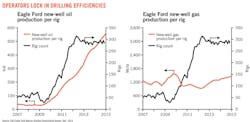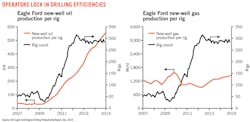Accenture: Eagle Ford operators cut costs with integrated planning, better logistics
Accenture examined the importance of integrated planning and logistics as a way to save money for operators in the South Texas Eagle Ford, a region that the unconventional oil and gas industry already considers as a model for the manufacturing approach.
"The low oil price really makes this paper more relevant as it's focused on cost reduction and efficiency opportunities," Melissa Stark, Accenture's managing director energy, told UOGR in a telephone interview from her London office.
The manufacturing model typically involves operators working to standardize well designs and increase pad drilling to create predictability and repeatability in drilling and production activities.
In a 2014 paper, Accenture focused on "above-ground optimization," Stark said, adding that some Eagle Ford operators have slashed costs up to 40% through integrated planning. The paper is titled "Achieving high performance in unconventional operations: Integrated planning, services, and materials managements."
Accenture spent 18 months on the paper, which included surveying unconventional operators across US and Canada shale plays on leading practices. Researchers devoted half-day interviews for certain operators in the Eagle Ford.
Stark said Accenture concentrated on the Eagle Ford because so much investment was planned there.
The paper concluded operators vary in the way they plan operations and focus on continuous improvement. Operators also vary in the way they use data to make decisions and manage contractors.
Unconventional operators have to weigh trade-offs in deciding how and when to invest in technology, continuous improvement, and people.
"Understanding the trade-offs and impact on total well cost is critical," the paper said. "For example, how will investment in new rig technology affect rig moves? Is utilizing new technology a better choice than offering incentives to your service provider to ensure consistency of crew?"
Researchers found some Eagle Ford operators spent about $6 million/well while others spent twice that much on a well in the same area.
Eagle Ford operators vary from large integrated companies primarily focused on developing conventional oil and gas assets to large and small independents. Their operational metrics also vary.
"The large independent operators are leading the pack, managing the largest operations in terms of numbers of rigs and achieving record oil and gas production," Accenture said. "They also run the most efficient operations in terms of well costs and days to drill."
Accenture's report covers several planning and management issues and recommends ways that unconventional operators can improve performance, including:
• Field-level planning: Frequently, unconventional well-delivery programs drill up to 3-4 wells/week, which requires a step change in alignment, coordination, and communication that can no longer be managed through status meeting updates as companies might have done for scheduling conventional wells.
• Logistics management: A large number of suppliers and contractors are involved with unconventional development, often with different vendors for each step: site preparation, drilling, fracturing, completions, water management, and logistics. Operators need to ensure collaboration between contractors and apply strict financial controls and management to meet safety, commercial, and operational requirements.
"Controlling exactly who is in the field, what they are doing, and when they are doing it continues to be a significant challenge," Accenture said. "While a particular supplier has met health, safety, and environment pre-qualifications, actual performance will depend on the individuals on the team that day. It is incumbent upon the operator to have clear competency models." Operators interviewed by Accenture suggested changing the operating model between contractors and operators from a command-and-control model to a more collaborative approach using financial controls and standardized practices. Operators said a collaborative approach can greatly reduce inefficiencies and reduce the time an operator spends on logistics planning and coordinating the supply chain, rig crews, fracturing crews, and others. Accenture said suppliers will prefer operators who develop collaborative relationships.
• Materials management: Given the number of wells on a multi-well pad and 24-hr crews, an unconventional operation requires volumes of materials available at exploration, development, and production sites. "Hundreds of hand-offs must take place before a well site can be completed. These hand-offs need to be efficient and agile to ensure the timely delivery of materials, reduce downtown, and avoid tying up working capital and racking up needless storage expenses," Accenture said. "Due to the volatile nature of the unconventional business, near-term demand should be updated weekly to provide suppliers with the most up-to-date information."
Accenture's research shows that "the top-quartile operators are the best at balancing the trade-offs between technology, continuous improvement, and investment in people," the paper concluded. "These are operators with considerable unconventional experience, and they know how to operate in high-volume environments and get the incremental improvements required to achieve margin targets."
One large independent told Accenture that it procures 80% of its needed products and services under contract, reducing premiums for last-minute arrangements.
"Perhaps the biggest benefit of long-term planning is that it can lock in 2- or 3-year contracts to ensure consistent crews for its operations," Accenture said, adding that consistency of crew "provides a tremendous competitive advantage in reducing costs and time to production."
About the Author
Paula Dittrick
Senior Staff Writer
Paula Dittrick has covered oil and gas from Houston for more than 20 years. Starting in May 2007, she developed a health, safety, and environment beat for Oil & Gas Journal. Dittrick is familiar with the industry’s financial aspects. She also monitors issues associated with carbon sequestration and renewable energy.
Dittrick joined OGJ in February 2001. Previously, she worked for Dow Jones and United Press International. She began writing about oil and gas as UPI’s West Texas bureau chief during the 1980s. She earned a Bachelor’s of Science degree in journalism from the University of Nebraska in 1974.


